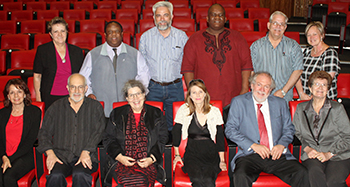Latest News Archive
Please select Category, Year, and then Month to display items
31 March 2021
|
Story Xolisa Mnukwa
![]()
The University of the Free State (UFS) Bloemfontein Campus conducted its first digital Campus Student Representative Council (CSCR) elections for the 2020/2021 SRC term. Elections for the 12 ex officio portfolios were conducted from 1 to 4 December 2020, while the elections for the 7 elective portfolios were conducted from 23 to 26 March 2021.
Of the 22 941
eligible voters for the elective portfolios, 8 044 cast their votes, which accounts for 35% of the voter’s roll. The 2021 voter turnout is an increase of 9,53% compared to the 2019 elections that were conducted manually. The CSRC incumbents mentioned below were officially inaugurated on 29 March 2021 and an official handover of the outgoing to the incoming incumbents was facilitated by the Student Governance Office.
The results below depict the final outcome of the CSRC elective portfolios. Elections were concluded at 21:00 on 26 March 2021. Watch video for the official inauguration.
| Position | Candidate | Votes |
| PRESIDENT | Jerry Thoka | 5 747 (74,6%) |
| Kamohelo Seleke | 1 960 (25.4%) |
| DEPUTY PRESIDENT | Loretta Mosito | 5 563 (72,4%) |
| Esona Yapi | 2 116 (27,6%) |
| SECRETARY | Ayanda Dlova | 5 988 (78,3%) |
| Simphiwe Zonke | 1 660 (21,7%) |
| TREASURER | Orefile Sefika | 5 425 (70,7%) |
| Thandiwe Kula | 2 246 (29,3%) |
| POLICY AND TRANSFORMATION | Vusumzi Gqalane | 4 988 (63,8%) |
| Thabo Duma | 1 649 (21,1%) |
| Nompumelelo Khoza | 1 178 (15,1%) |
| STUDENT DEVELOPMENT AND FIRST-GENERATION STUDENTS | Tshiamo Sebolai | 4 681 (60,4%) |
| Fhumulani Sididzha | 1 707 (22,0%) |
| Ofentse Ntsane | 1 365 (17,6%) |
| COMMUTER STUDENTS | Dimpho Mokhoantle | 4 469 (58,1%) |
| Marumo Rakwata | 1 643 (21,4%) |
| Lusanda Feleza | 1 582 (20,6%) |
The results below depict the outcome of the ex officio elections that took place from 1 to 4 December 2020:
| Position | Candidate |
|---|
| ASSOCIATIONS STUDENT COUNCIL | Michael Mnguni |
| STUDENT ORGANISATIONS COUNCIL | Tebogo Sako |
| ACADEMIC STUDENT COUNCIL | Katlego Booysen |
| DAY RESIDENCE COUNCIL | Sibongiseni Mncela |
| CAMPUS RESIDENCE COUNCIL | Mpho Maubane |
| POSTGRADUATE STUDENT COUNCIL | Nico Janse van Rensburg |
| INTERNATIONAL STUDENT COUNCIL | Rufaro Chakanyuka |
| STUDENT MEDIA AND DIALOGUE COUNCIL | Wandile Manqele |
| UNIVERSAL ACCESS AND SOCIAL JUSTICE COUNCIL | Katlego Sekele |
| CIVIC AND SOCIAL RESPONSIBILITY COUNCIL | Gert Terblanche |
| ARTS AND CULTURE COUNCIL | Katleho Khaola |
| SPORTS COUNCIL | Bongumusa Khumalo |
Special Edition of the Journal for New Generation Sciences launched at UFS
2016-10-26

Participants of the round-table discussion
at the launch of the Journal for New Generation
Sciences during the UFS Faculty of Education
colloquium which took place on 20 October 2016.
Photo: Oteng Mpete
The Journal for New Generation Sciences Special Edition was launched on 20 October 2016, at the Albert Wessels Auditorium, during the University of the Free State’s (UFS) Faculty of Education colloquium on the field of technological higher education and its contribution to the knowledge society.
Partnerships and knowledge production
Prof Laetus Lategan, Dean of Research and Innovation at the Central University of Technology (CUT), led the launch. “Higher education is not only about producing knowledge but it is also about fostering new relationships,” said Prof Lategan referring to CUT’s collaboration with the UFS Faculty of Education.
“Empowering people is important for capacity building, offering novice writers the opportunity to learn and a way to enhance their academic writing,” said Prof Lategan.
The Journal for New Generation Sciences is an accredited research publication in which scholars, internal and external to the institution, may publish. It accommodates national and international publications and showcases the university’s commitment to applied research.
Growing in leaps and bounds
According to Dr Somarie Holtzhausen, from the Faculty of Education’s School of Higher Education Studies, all papers are peer-reviewed by at least two experts. An editorial review also secures the quality of the paper. In 2014, when the journal was established, 30 contributions were submitted, although only 25 were successfully published.
“We turn down content not because it is not good, but unfortunately because it does not speak to the heart of the journal,” said Prof Lategan. With 60 peer reviewers, the journal’s contributors are assured that at least two peer reviewers will assess their article.
The Journal for New Generation Sciences supports both high-quality scholarly work of established researchers, and capacity building among new researchers.
During the round-table discussion various contributors to the journal spoke about their research and involvement in the publication of the journal.